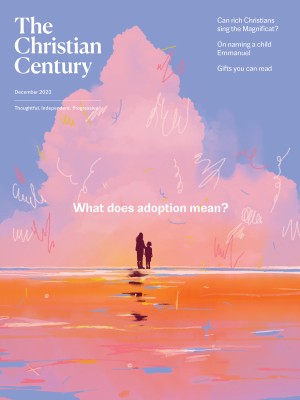December 10, Advent 2B (Isaiah 40:1–11; Mark 1:1–8)
There is a clear distinction between being comfortable and receiving comfort.
I serve as a college pastor at a small, denominational, liberal arts college. A frequent topic of conversation among faculty, administration, and student support staff members is the question of the institution’s responsibility toward maintaining the comfort of our students. Not merely their physical comfort but their intellectual, emotional, and spiritual comfort.
This current generation of college students is uniquely resilient, having emerged through the COVID pandemic. These students have lived in a time when talking about mental health is encouraged and not taboo. They have learned the language of self-awareness and emotional intelligence. Influenced by the Me Too movement, they have cultivated an appreciation for clear boundaries, they care deeply about consent, they have strong ideals regarding justice, and they possess strong moral opinions about right and wrong, good and evil.
Read our latest issue or browse back issues.
These students are in touch with their beliefs, their needs, and their visions for an ideal world. This is most certainly a good thing.
There are shadow sides to this self-awareness, however. Boundaries can become dividing walls. Advocacy can turn to judgment. Self-care can turn to disengagement. Emotional self-protection can lead to entitlement or defensiveness. This can all lead to rejection of or even disgust with the normal human experience of discomfort.
Around campus, we talk frequently about how to normalize discomfort as a necessary and valuable part of personal development. We continue to wrestle with how best to equip students with the skills to navigate discomfort and how best to support them.
Isaiah proclaims words of comfort to those who have experienced something far beyond discomfort. Israel is emerging from destruction and exile, suffering and devastation beyond what we would ever try to describe simply as “character building.” For these exiles, comfort comes through the prophet’s words. Comfort sounds like the assurance that the worst is over; it looks like a return home. It feels like creation restored, like a clear path forward. Comfort resides in the glory and might of a victorious God, and it is poured out in God’s promises.
But lest we forget, it was the desire to remain comfortable that led Israel to the wilderness of exile in the first place. Early oracles in the book of Isaiah proclaim God’s judgment against all the ways the people have mortgaged faithfulness for comfort: hoarding wealth, protecting privilege, and garnering favor through political and military conniving.
It seems, from reading Isaiah, that there is a clear distinction between being comfortable and receiving comfort. Being comfortable involves the pursuit of self-interest, even seemingly well-meaning self-interest. We speak of things like “creature comforts.” We refer to a certain threshold of wealth (in which we are able to attain basic luxuries with relative ease) as “making a comfortable living.” Tried-and-true methods, ideas, and even relationships are described as being “as comfortable as an old shoe.” These idioms represent values of familiarity and ease. They convey feelings of suspicion about newness and change.
Receiving comfort, on the other hand, is what God promises to those who navigate the wilderness. The wilderness is inherently a place of discomfort. In scripture and literature, wilderness represents that which is unknown, feral, uncontrolled, and challenging. It evokes a sense of vulnerability and exposure. But wilderness also implies growth, journey, and the possibility for divine encounter. Think Moses and the burning bush, Elijah and the still-small voice, Hagar and the well, Jesus after his baptism, and, in this week’s gospel reading, John the Baptizer.
I can’t imagine John was very comfortable out there in the wilderness. A camel-hair cloak sounds kind of itchy, and it takes a special type of foodie to appreciate entomological cuisine. But the wilderness—and everything it represents—provides the perfect backdrop for his message about a coming Messiah, an emergent kingdom of God, and an upending of life as usual.
We can thank American humorist Finley Peter Dunne for coining the phrase “comforting the afflicted and afflicting the comfortable.” He was talking about newspapers, but his words have theological merit as well. The promises of God are not comfortable. Mountains will be brought low and valleys raised up. The powerful will be humbled and the vulnerable lifted. These reversals bring comfort to those who are despairing and in exile, even as they bring discomfort to those who are accustomed to privilege.
Discomfort is holy, when it leads us to deeper love for God and neighbor. It is sacred when it spurs our hearts to love and good deeds. It is a blessing when it drives us to seek justice and liberation. It does not cut us off from God’s promises of comfort but rather makes space for us to receive them.





